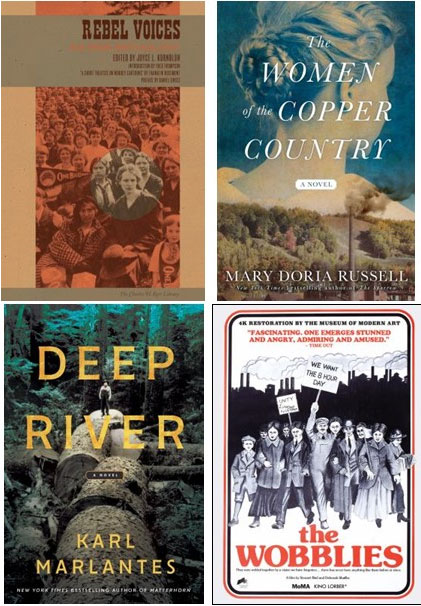Whatcom READS season is in full swing, and now that you’ve had a chance to read Jess Walter’s novel “The Cold Millions,” you can dig deeper by availing yourself of library materials from public libraries and local higher-ed institutions. The Whatcom READS website links to a lengthy list of titles exploring topics mentioned in the book, such as the early years of the labor movement, vaudeville and Spokane history.
In “Rebel Voices: An IWW Anthology,” editor Joyce L. Kornblum presents a vivid picture of the groundbreaking labor union known as the Wobblies. Cartoons and photographs lend visual interest to transcripts of seminal speeches by union organizers. She includes a section with “language of the migratory worker” with such etymological gems as “biscuit-shooter” (a short-order cook) and “jungle buzzard” (a hobo who loiters around a railroad gathering spot hoping for a meal). There are also a smattering of Wobbly slogans and Joe Hill’s protest songs.
Those who loved Walter’s portrayal of Elizabeth Gurley Flynn in “The Cold Millions” will enjoy reading the detailed and elucidating recount of the Paterson Strike Flynn delivered to the New York Civic Club in 1914, six years after the Spokane free speech fights.
For a fictional account of another female organizer, look to Mary Doria Russell’s “The Women of the Copper Country,” which tells the story of Annie Clemenc of Calumet, Michigan. “Big Annie” led the Women’s Auxiliary No. 15 of the Western Federation of Miners during the Copper Country strike of 1913–14. Russell’s writing is engaging, fluid and well-researched.
Karl Marlantes’ novel “Deep River” also features a female protagonist, a stubborn and stoic Finnish immigrant named Aino Koski, whose fight for timber workers’ rights in the forests of southern Washington threatens her life and her dreams for a family of her own.
Local readers will recognize familiar names in this sweeping epic — like Bloedel, Simpson and Weyerhaeuser — although the Finnish ones, like Kyllikki, Jouka and Lempi, may take some getting used to. Reading this book takes dedication — it clocks in at 714 pages, but for those who enjoy in-depth history and following one character’s whole life, this fits the bill.
Those who prefer their history delivered via screen can check out the documentary film “The Wobblies,” available on DVD. First released in 1979 and restored by the Museum of Modern Art, this movie is unapologetically one-sided in its admiration for the men and women who were at the forefront of the modern labor movement, bringing together unskilled workers from disparate industries (timber, mining, manufacturing, agriculture) under the IWW umbrella.
The directors were fortunate to be able to interview many former Wobblies, then in their 80s and 90s, making this a treasure of first-person accounts. The film includes clips of songs, cartoons and archival footage to give the full flavor of the early days of the Wobblies, from their founding in Chicago in 1905.
If these books and film have not sated your curiosity about the IWW, don’t miss a talk on “The IWW Today” presented by organizers from the Whatcom–Skagit chapter taking place at 7 p.m. Wednesday, Feb. 15 at Village Books in Fairhaven.
Additional Whatcom READS programming explores other topics, like “Vaudeville and Vice in the Early 1900s,” to be held at 1 p.m. Saturday, Feb. 18 at Whatcom Museum’s Old City Hall Rotunda Room. Author Jess Walter visits Whatcom County March 2 to 3. For more details and to register for events, go to whatcomreads.org.
Christine Perkins is executive director of the Whatcom County Library System, which serves all the communities in Whatcom County outside the city limits of Bellingham. Experience the power of sharing — at the library!
(Originally published in Cascadia Daily News, Saturday, February 11, 2023.)

